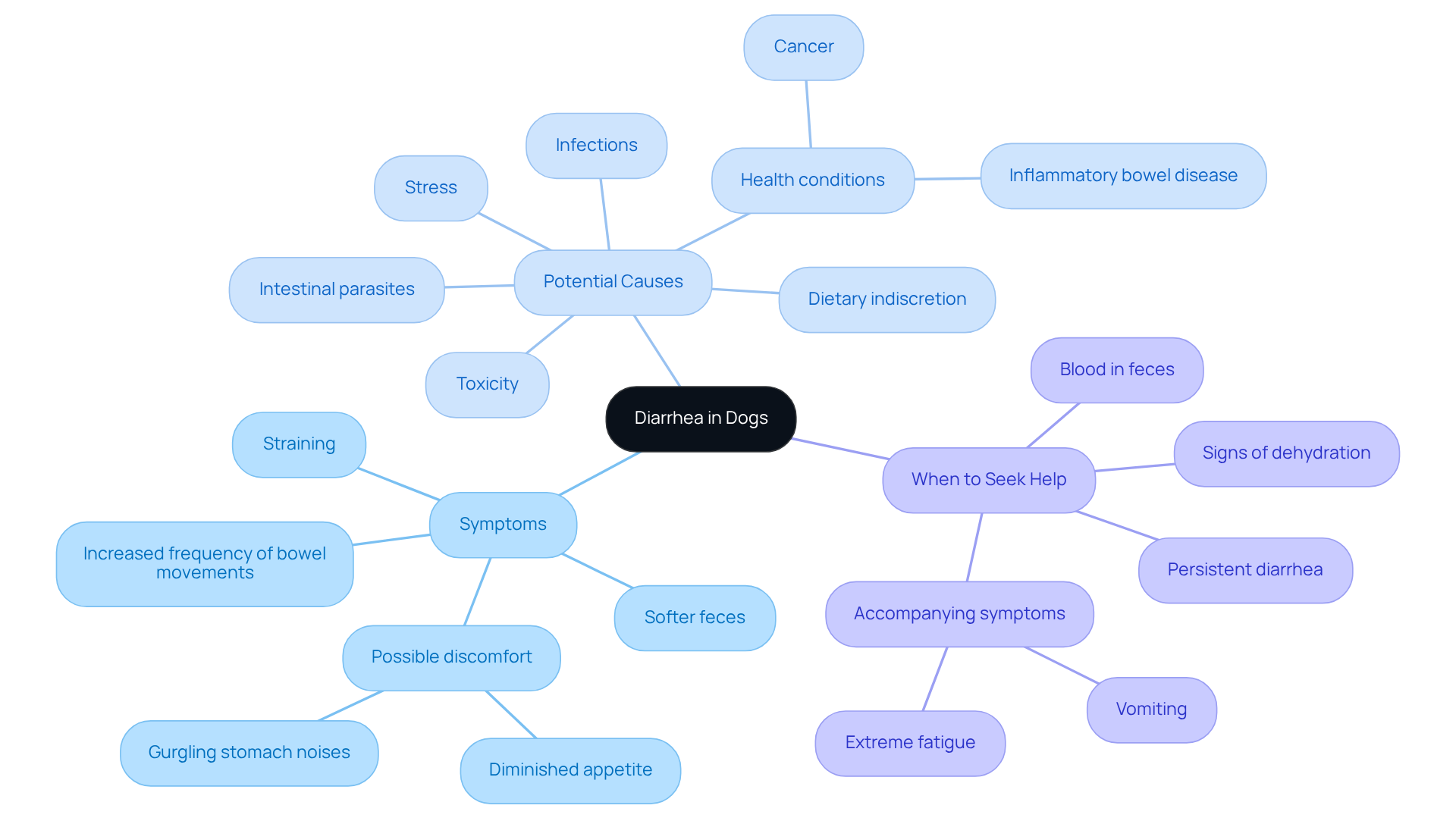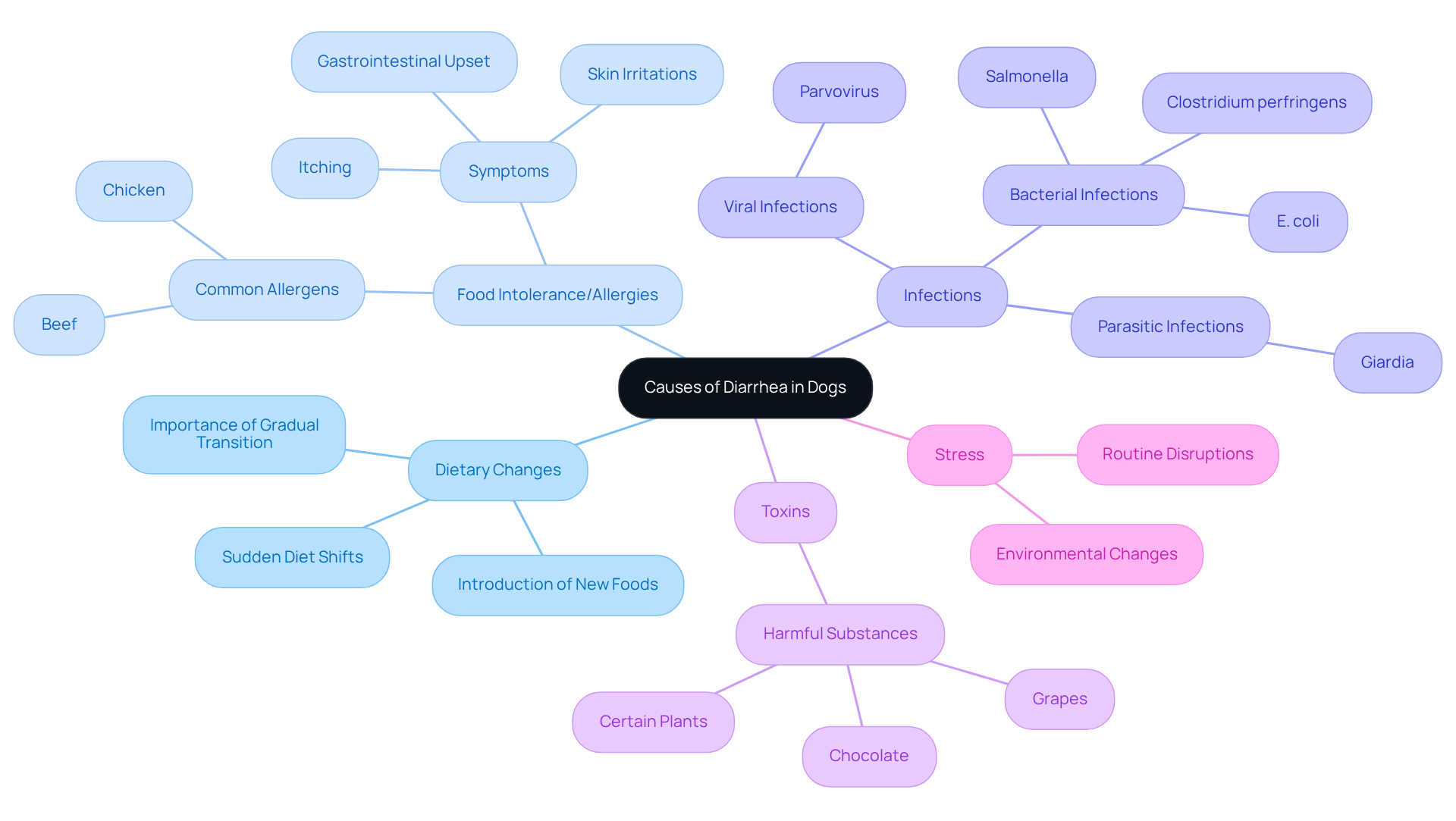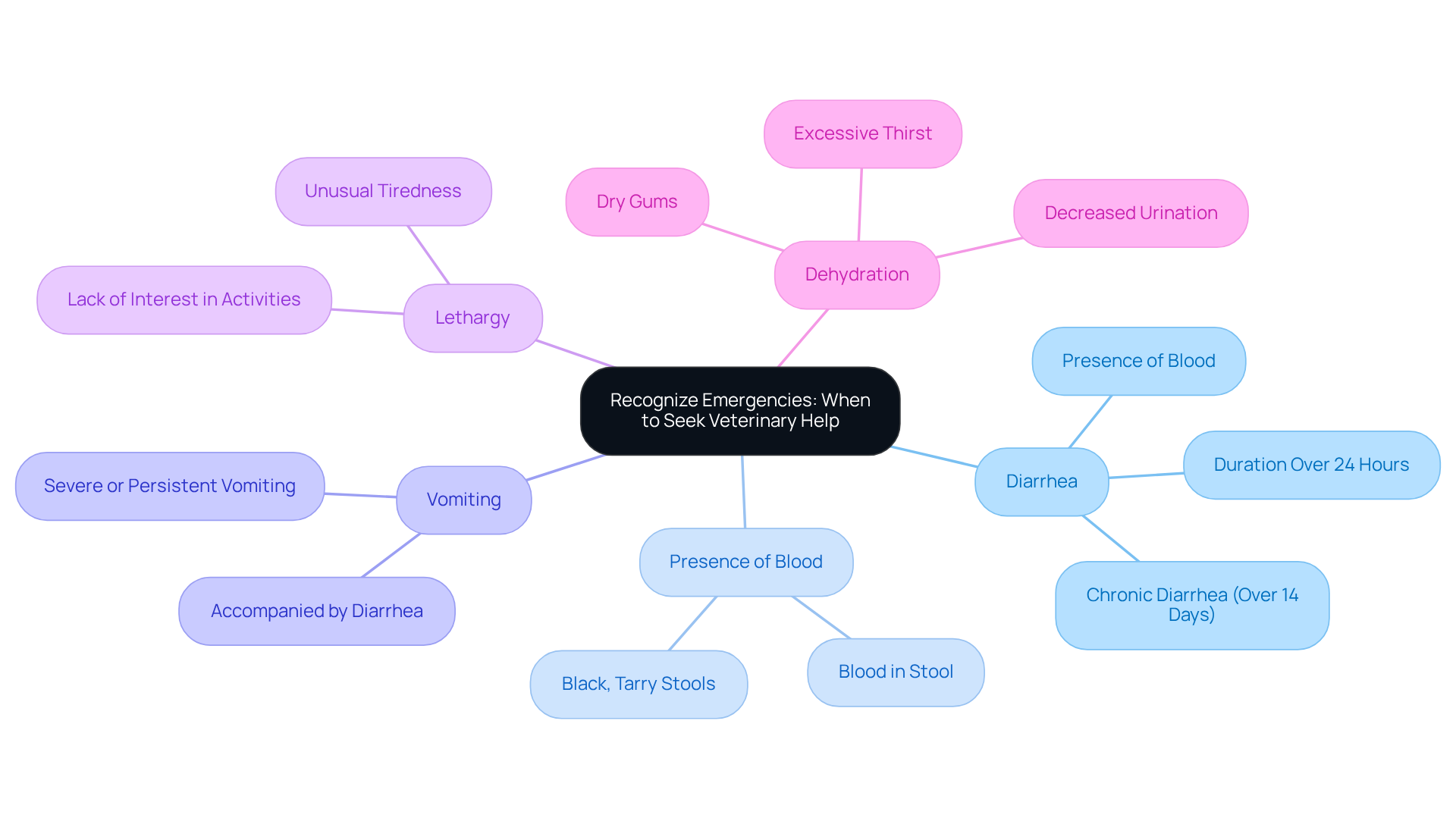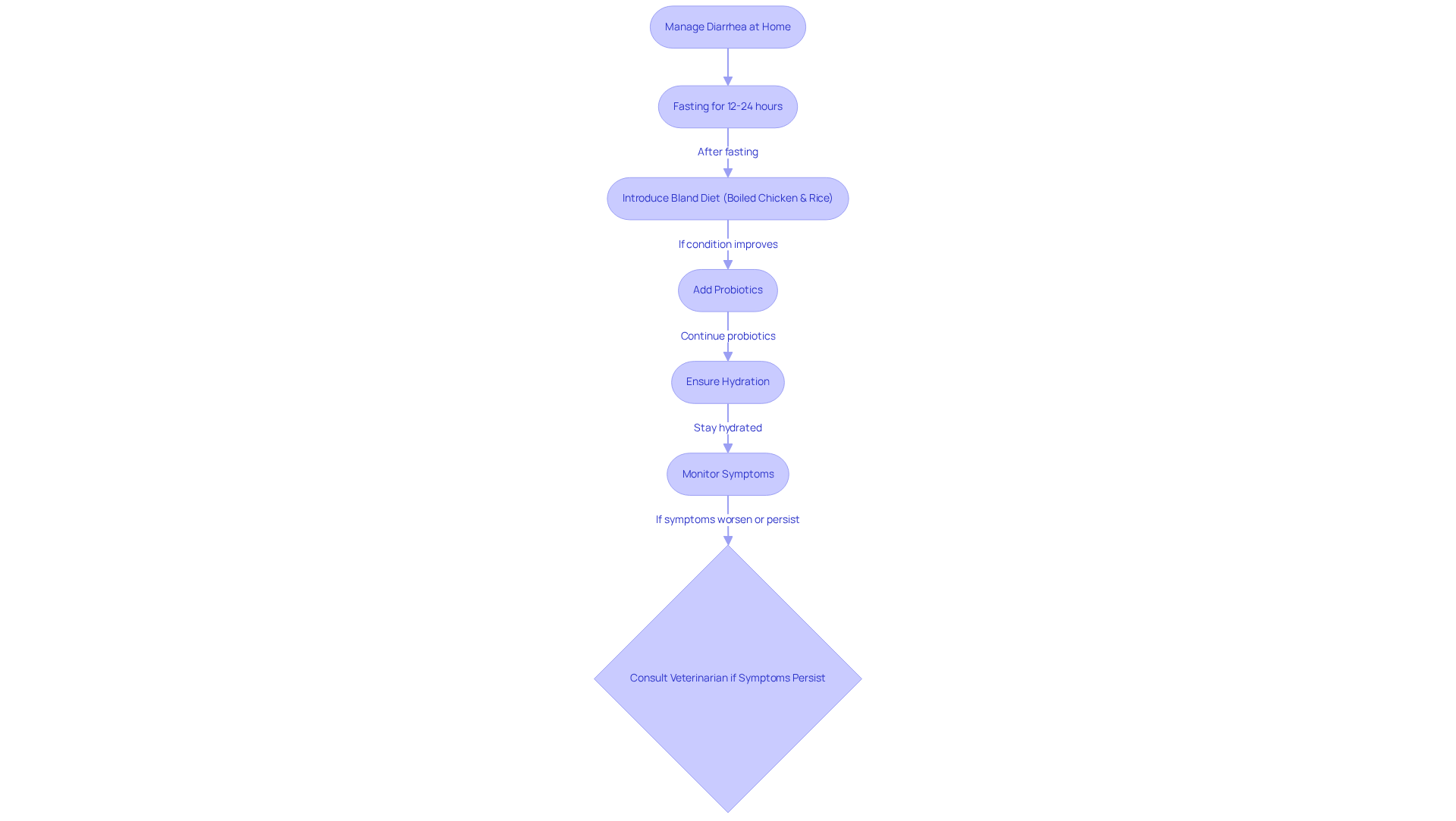
My Dog Has Diarrhea But Is Acting Fine: Key Insights for Pet Owners
Overview
Diarrhea in dogs can be concerning, even when they seem to be acting fine. This issue may arise from various factors, such as:
- Dietary changes
- Infections
- Food intolerances
- Toxins
- Stress
It’s essential to observe your furry friend closely and manage their condition with care. We understand how worrying it can be to see your pet unwell, and it’s vital to monitor their symptoms closely. Knowing when to seek veterinary care can make a significant difference in your dog’s recovery.
Implementing home care strategies can also support your dog’s well-being. Fasting and a bland diet are gentle approaches that can help your pet recover while ensuring they feel comfortable. Remember, you’re not alone in this; many pet owners share your concerns and want the best for their beloved companions. By taking these steps, you’re showing your commitment to their health and happiness, and that’s what truly matters.
Introduction
When our beloved canine companions experience diarrhea yet seem to be acting normally, it can leave us feeling bewildered and anxious. It’s important to recognize that this common issue can arise from a variety of causes, such as dietary indiscretions or stress. Understanding these nuances is crucial for pet owners who care deeply about their furry friends.
This article aims to provide essential insights, guiding you through:
- Recognizing symptoms
- Identifying potential triggers
- Knowing when it’s time to seek veterinary help
What should you do when faced with a seemingly healthy dog who is experiencing digestive distress? We’re here to help you navigate this challenging situation.
Define Diarrhea in Dogs: Understanding the Basics
Diarrhea in dogs can be a distressing experience, especially when my dog has diarrhea but is acting fine, as it involves the passage of loose, watery feces occurring more frequently than usual. Pet owners may understandably worry when my dog has diarrhea but is acting fine, as this condition may indicate various underlying health issues, such as dietary indiscretion, infections, or stress. Regular waste should be solid and properly shaped, whereas loose bowel movements may appear runny or fluid. While my dog has diarrhea but is acting fine, loose stools can be uncomfortable for your beloved pet and often serve as a natural reaction to irritants in their digestive system.
Recognizing the signs of loose bowel movements is crucial; these may include:
- Softer feces
- An increased frequency of bowel actions
- Straining
- Possible discomfort, such as gurgling stomach noises or a diminished appetite
It’s important to grasp the difference between mild and severe gastrointestinal upset, as this understanding will guide you in determining the best course of action. Mild cases may resolve with loving home care, while severe digestive issues—especially if my dog has diarrhea but is acting fine, or accompanied by symptoms like blood in the feces or signs of dehydration—call for prompt veterinary attention. In fact, gastrointestinal upset is one of the top reasons pet owners seek veterinary care, underscoring its significance in managing your dog’s health.
By keeping a close eye on your dog’s stool consistency and behavior, you can better assess their condition and respond effectively. Your attentiveness not only supports their well-being but also reinforces the bond you share. Remember, you’re not alone in this; many pet owners face similar challenges, and there are compassionate solutions available to ensure your furry friend receives the care they need.

Identify Causes of Diarrhea: Common Triggers and Conditions
Diarrhea in dogs can arise from various causes, each requiring careful consideration and a compassionate approach. As a pet owner, it’s natural to feel concerned when I notice that my dog has diarrhea but is acting fine. Understanding the potential triggers can help you navigate this challenging situation with care and confidence.
-
Dietary Changes: Sudden shifts in diet or the introduction of new foods can disrupt a dog’s digestive system, often leading to diarrhea. It’s crucial to transition to new foods gradually to minimize gastrointestinal upset. Research shows that diet is the main factor in 66% of instances with an inflammatory response, and in just over 15% of cases, the issue could not be resolved. This highlights the importance of being gentle with your dog’s dietary changes.
-
Food Intolerance or Allergies: Many dogs exhibit sensitivities to specific ingredients, which can trigger gastrointestinal distress. Common allergens include proteins such as chicken or beef, and symptoms may manifest as gastrointestinal upset, itching, or skin irritations. Dr. Sarah Nold emphasizes the significance of presenting one item or treat at a time to identify possible triggers of digestive upset. This method fosters a deeper understanding of your dog’s unique needs.
-
Infections: Diarrhea can also result from bacterial, viral, or parasitic infections. Notable pathogens include Clostridium perfringens, E. coli, Salmonella, parvovirus, and Giardia, all of which can lead to severe gastrointestinal issues. Regular veterinary check-ups and vaccinations are essential to prevent these infections, ensuring your furry friend stays healthy and happy.
-
Toxins: Consuming harmful substances, such as certain plants, chemicals, or poisonous human foods like grapes and chocolate, can lead to gastrointestinal distress. As a caring pet owner, it’s vital to be vigilant about keeping these substances out of reach, creating a safe environment for your dog.
-
Stress: Environmental changes or disruptions in routine can induce tension in canines, resulting in stress-related loose stools. Maintaining a stable environment and minimizing stressors can help alleviate this issue, allowing your dog to feel secure and comfortable.
By understanding these triggers, you can better assess your dog’s condition, particularly in situations where my dog has diarrhea but is acting fine, and determine whether dietary adjustments or other interventions are necessary. Furthermore, loose stools can lead to dehydration, so it’s important to ensure that your canine has access to fresh, clean water at all times. For dogs recovering from gastrointestinal upset, a bland diet, such as cooked chicken and rice, is often recommended. This gentle approach can provide comfort and nourishment as your dog heals.

Recognize Emergencies: When to Seek Veterinary Help
While many instances of loose stools can be managed at home, there are certain signs that indicate it’s time to seek veterinary care for your beloved pet. As a caring pet owner, it’s essential to recognize these signs to ensure your furry friend receives the attention they need.
- Diarrhea Persists: If your pet’s diarrhea lasts more than 24 hours without improvement, it may signal an underlying issue that needs addressing. Should it continue for more than 48 hours, reaching out to a veterinarian is strongly advised. It’s heartbreaking to see our pets unwell, and knowing when to act can make all the difference.
- Presence of Blood: Discovering blood in the stool or noticing black, tarry stools can be alarming. These symptoms can indicate serious conditions such as internal bleeding or hemorrhagic gastroenteritis, which require immediate attention. Dr. Beth Turner compassionately reminds us, “Always contact a veterinarian if you see any blood, even if they vomit only once.” Your pet’s health is paramount, and seeking help promptly is vital.
- Vomiting: If your pet is also experiencing vomiting, especially if it’s severe or persistent, this can exacerbate dehydration and signal a more serious gastrointestinal problem. It’s crucial to monitor your pet closely and take action if these symptoms arise.
- Lethargy: An unusual level of tiredness, unresponsiveness, or a lack of interest in activities can be concerning signs of a serious health issue. As pet owners, we know our pets best, and any significant changes in behavior should not be ignored.
- Dehydration: Look out for signs of dehydration, such as dry gums, excessive thirst, or decreased urination. These are critical indicators that veterinary intervention is needed. Your pet relies on you to recognize these signs and act accordingly.
Identifying these emergencies is essential, as untreated bowel issues can lead to serious health complications. Research indicates that 14.9% of canines experience digestive issues within a two-week timeframe, making these problems one of the most frequent reasons for veterinary visits. This underscores the importance of monitoring your pet’s health attentively. Younger dogs and puppies are especially susceptible to gastrointestinal issues caused by parasites and dietary changes. Prompt action can ensure that your pet receives the necessary care and improve their chances of a swift recovery. Remember, you are not alone in this journey; there is support available to help your furry family member thrive.

Manage Diarrhea at Home: Effective Treatments and Care Strategies
Dealing with intestinal upset in your beloved pet can be distressing, particularly when my dog has diarrhea but is acting fine, and you want to ensure their comfort and well-being. Thankfully, there are several gentle strategies you can try at home, particularly for mild cases.
Consider fasting for a brief period of 12 to 24 hours. This pause can provide your dog’s digestive system with the much-needed time to recover. Always ensure that fresh water is readily available to keep your furry friend hydrated and prevent dehydration during this time.
Once the fasting period has passed, you might introduce a bland diet. A simple meal of boiled chicken (without skin) and white rice can be soothing for their stomach. If your dog’s condition improves, gradually reintroduce their regular food after a couple of days.
Adding probiotics to your dog’s diet can also be beneficial, as they help restore healthy gut flora. This small step can make a significant difference in your pet’s digestive health.
It’s essential to keep your dog well-hydrated, so offer them water or an electrolyte solution specifically designed for pets. Staying hydrated is crucial for their recovery.
Lastly, be vigilant and monitor symptoms closely. Take note of any changes in your dog’s behavior or stool consistency, particularly since my dog has diarrhea but is acting fine, as these can provide important insights into their health.
These compassionate strategies can effectively manage mild diarrhea, but remember, if symptoms persist or worsen, it’s always best to consult a veterinarian. Your pet’s health and happiness are paramount, and seeking professional advice is a loving step to take.

Conclusion
Understanding the complexities of canine diarrhea is essential for every pet owner. Witnessing a dog with diarrhea while appearing otherwise fine can be both perplexing and concerning. It’s important to recognize that diarrhea can arise from various causes, ranging from dietary indiscretion to infections, which is crucial for effective management and care. By staying informed and attentive, pet owners can navigate these challenges with confidence and compassion.
Throughout this discussion, we’ve shared key insights regarding the identification of symptoms, potential triggers, and when to seek veterinary assistance. From recognizing the signs of mild gastrointestinal upset to understanding the importance of hydration and dietary adjustments, the guidance offered empowers pet owners to take proactive steps in caring for their furry companions. Moreover, knowing when to escalate concerns to a veterinarian can be lifesaving, ensuring timely intervention in more serious cases.
Ultimately, the health and happiness of our dogs are paramount. By remaining informed and vigilant, pet owners can create a nurturing environment that supports their pets through gastrointestinal challenges. Embracing a proactive approach not only enhances a dog’s well-being but also strengthens the bond between pet and owner. Taking the time to understand and address diarrhea in dogs is a vital aspect of responsible pet ownership, ensuring that our beloved companions lead healthy and joyful lives.
